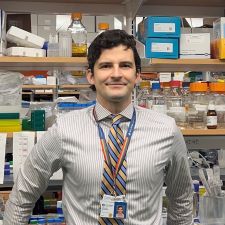Acute myeloid leukemia (AML) with rearrangements of the KMT2A gene (KMT2A-r) or NPM1 mutation (NPM1m) affect children and adults and can be difficult to treat even with highly intensive therapy. Targeted, less toxic therapies are urgently needed. Menin inhibitors are novel small molecules that block a critical interaction between the KMT2A protein and another protein called menin. This protein-protein interaction is essential in sustaining both KMT2A-r and NPM1m AML. Menin inhibitors have now entered clinical trials for children and adults have shown promising results. However, it has also been demonstrated that up to 40% of patients will develop resistance to a menin inhibitor when it is given alone due to a mutation in the MEN1 gene, which encodes the protein menin. Dr. Bourgeois is investigating whether combination therapy can prevent or overcome MEN1 mutations that confer resistance to menin inhibitors. Additionally, he is developing models to understand how and why resistance to menin inhibitors is sometimes driven by MEN1 mutations, but other times not. The overarching goal of the project is to identify combination therapies that prevent and overcome menin inhibitor resistance and to better understand the different ways in which resistance to menin inhibitors develops.
Damon Runyon Researchers
Meet Our Scientists
Wallace A. Bourgeois, MD
Project title: "Characterizing mechanisms of resistance to Menin inhibitors in KMT2A-rearranged and NPM1-mutant AML"
Institution: Dana-Farber Cancer Institute
Award Program: Physician-Scientist
Sponsor(s) / Mentor(s): Scott A. Armstrong, MD, PhD
Cancer Type: Blood
Research Area: Epigenetics







